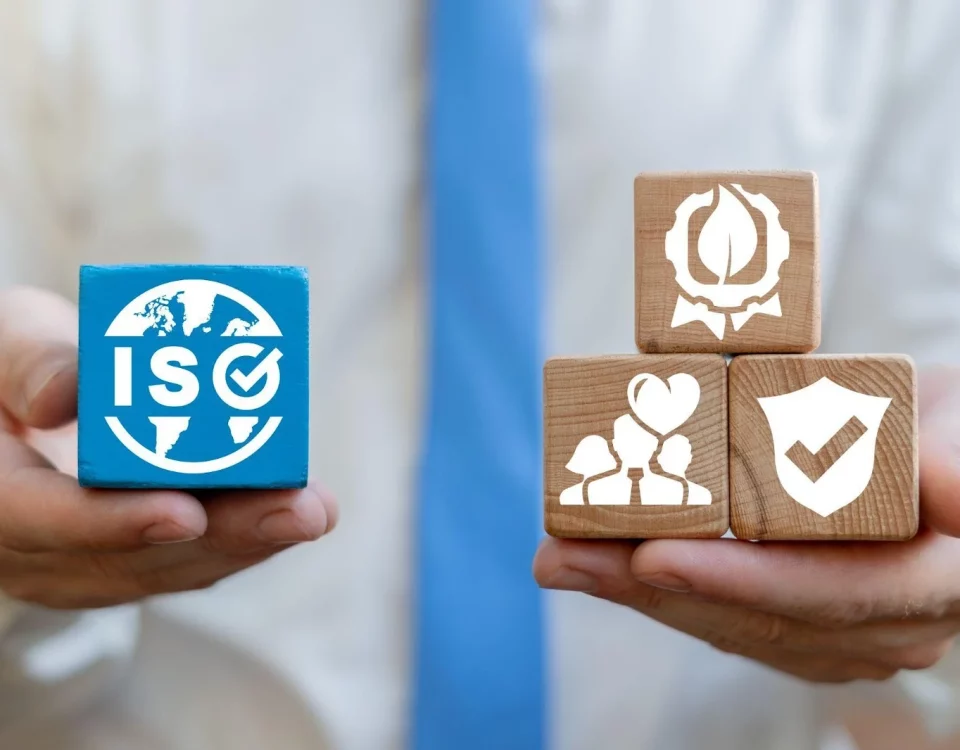- About
- Services
- Sectors
- Resources
- Locations
- ISO Certification in the United States of America
- ISO Certification in the United Kingdom
- ISO Certification in Canada
- ISO Certification in Australia
- ISO Certification in New Zealand
- ISO Certification in California
- ISO Certification in London
- ISO Certification in Los Angeles
- ISO Certification in New York
- Contact
GB
How ISO/IEC 27001 Helps Protecting Information Security in the Consulting & Distribution Industry

The Importance of ISO/IEC 27001 for IT Companies
7 December 2023
Why ISO 50001 is Important for Energy Conservation Strategies for Manufacturing Facilities
12 January 2024When considering protecting information security within Consulting and Distribution, many options can help; one is ISO/IEC 27001. An ISO/IEC 27001 certificate focuses on an information security management system. It provides a systematic and structured approach for organizations to manage and protect sensitive information, ensuring confidentiality, integrity, and availability.
This, in turn, can offer your business assistance with information security threats. Throughout this article, we will dive deeper into how an ISO/IEC 27001 certification can help those in the consulting and distribution industry.
What ISO Certification do you need for Information Security?
For businesses in the consulting and distribution industries seeking to enhance information security, ISO/IEC 27001 certification proves relevance for businesses. This certification provides a framework for establishing, implementing, and maintaining an Information Security Management System (ISMS).
It focuses on setting up a systematic approach to managing sensitive company information, ensuring its confidentiality, integrity, and availability. Adopting ISO/IEC 27001 standards helps reduce the risk of data breaches and cyber threats, thus building trust with clients and stakeholders.
Importance of Information Security in the Consulting & Distribution Industry
Information security is of critical importance in the consulting and distribution industry for several key reasons:
Protection of Sensitive Data
Both industries handle sensitive information, including client data, business strategies, and financial records. A breach in information security can lead to the loss or compromise of this data, which can have severe consequences for the business and its clients.
Maintaining Client Trust and Reputation
In these industries, the trust of clients is paramount. Any information breach can lead to a loss of client trust and damage the business's reputation. It's essential to have robust information security measures in place to maintain this trust and uphold the company's reputation.
Regulatory Compliance
Many regions have strict regulations regarding data handling and protection, especially in industries like consulting and distribution, where client confidentiality is crucial. Adhering to these regulations is about compliance and demonstrating to clients and stakeholders that the business is responsible and trustworthy.
Operational Continuity
Information security breaches can disrupt business operations, leading to downtime and financial losses. By securing information effectively, businesses can ensure operational continuity and stability.
Competitive Advantage
A strong commitment to information security can be a significant competitive advantage. It can be a key differentiator in the market, as clients are increasingly looking for partners who can guarantee the safety and integrity of their information.
In summary, information security is not just about protecting data; it's about safeguarding the business's longevity, reputation, and relationships with clients and stakeholders in the consulting and distribution industry.
What is ISO/IEC 27001?
ISO/IEC 27001 is an international standard that outlines the requirements for establishing, implementing, maintaining, and continually improving a business's Information Security Management System (ISMS).
This standard is part of the ISO/IEC 27000 family of standards specifically designed to keep information assets secure. ISO/IEC 27001 provides a framework for companies to manage and protect their information securely based on a systematic business risk approach.
It enables organizations to establish and define their information security management processes, policies, and procedures. This includes a comprehensive set of controls, comprising best practices in information security. These controls address data protection, cybersecurity, IT governance, and physical security.
ISO/IEC 27001 certification is recognized globally as a mark of expertise in information security. By obtaining ISO/IEC 27001 certification, organizations demonstrate their commitment to information security, which can improve their reputation with clients and stakeholders and provide a competitive advantage.
The standard applies to all types of organizations, regardless of their size, type, or nature.
What is an Information Security Management System?
An Information Security Management System (ISMS) is a systematic and structured approach to managing sensitive company information so that it remains secure. It includes a set of policies, procedures, technical and physical controls to protect the confidentiality, integrity, and availability of information.
The ISMS encompasses digital and physical aspects of information security, covering areas such as risk management, employee training, business continuity, and data processing.
An ISMS aims to minimize risk and ensure business continuity by proactively limiting the impact of a security breach. An effective ISMS should be a central part of the organization's overall management structure and is often designed in accordance with international standards like ISO/IEC 27001.
Benefits of ISO/IEC 27001 Certification in the Consulting & Distribution Industry
Improvement in Information Security Measures
Achieving ISO/IEC 27001 certification enhances the information security measures within the consulting and distribution industry. This standard provides a framework for establishing information security policies, procedures, and controls.
By adhering to ISO/IEC 27001, businesses can systematically identify potential risks and vulnerabilities and implement security measures to protect sensitive data.
This helps safeguard critical business information against unauthorized access, data breaches, and cyber-attacks and promotes a culture of continuous improvement in information security practices within the organization.
Boost in Customer Confidence
In an industry where trust and confidentiality are important, ISO/IEC 27001 certification can be a differentiator, boosting customer confidence. When clients know that a consulting or distribution company is ISO/IEC 27001 certified, they gain assurance that their sensitive information is being managed and protected per internationally recognized standards.
This certification can often be a deciding factor for clients when choosing a business partner, as it demonstrates a commitment to maintaining the highest data security and privacy standards.
Compliance with Legal Requirements
Compliance with legal and regulatory requirements concerning data protection and privacy is crucial for businesses in the consulting and distribution sectors. ISO/IEC 27001 certification helps achieve this compliance by ensuring that the organization's information security management practices align with global standards.
It provides a structured framework for adhering to various legal, statutory, regulatory, and contractual requirements. By being ISO/IEC 27001 certified, businesses can potentially avoid the risks of non-compliance, such as legal penalties and financial losses but also reinforce their commitment to legal and ethical business practices.
ISO/IEC 27001 vs Other Information Security Certificates
When comparing ISO/IEC 27001 to other information security certifications, several key differences emerge:
Comprehensive Framework: ISO/IEC 27001 provides a comprehensive framework for managing and protecting information assets. Unlike other certifications focusing on specific aspects of information security, such as cybersecurity or data privacy, ISO/IEC 27001 encompasses a wide range of information security measures. It covers everything from risk assessment to implementing physical and IT controls, as well as ongoing monitoring and review processes.
Risk Management Focus: A distinctive feature of ISO/IEC 27001 is its emphasis on risk management. Companies must identify, analyze, and systematically manage information security risks. This approach is more holistic than other certifications that may concentrate on compliance with a prescribed set of controls without requiring a risk assessment.
Global Recognition: ISO/IEC 27001 is globally recognized and widely accepted as the benchmark for information security management. While other certifications may be region-specific or recognized primarily in specific industries, ISO/IEC 27001's international acceptance makes it a versatile and prestigious certification to acquire.
Flexibility and Scalability: ISO/IEC 27001 applies to organizations of any size and sector, offering flexibility and scalability. This contrasts with other certifications that might be tailored for specific types of businesses or industries.
Continuous Improvement: The ISO/IEC 27001 standard is based on continuous improvement. It assesses current compliance and requires ongoing monitoring and regular reviews of the ISMS, ensuring that information security practices remain effective over time. This aspect may be less emphasized in other certifications, which focus on meeting a set of standards at a specific point in time.
ISO/IEC 27001 stands out for its comprehensive approach, global recognition, focus on risk management, flexibility, and commitment to continuous improvement, setting it apart from other information security certifications.
How to get ISO/IEC 27001 Certified
Companies that receive ISO/IEC 27001 also reap the full benefits of enhanced information security, boosted customer confidence, and compliance with legal requirements.
Get in touch with us at QAS International for your ISO certification requirements.





